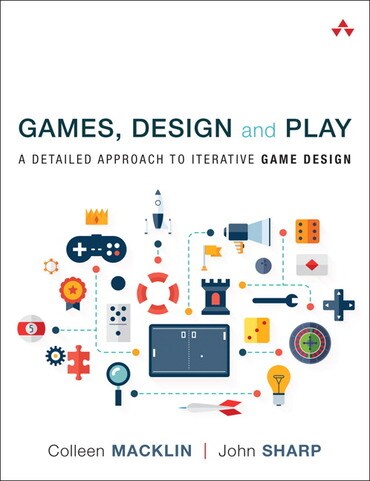
- Colleen Macklin |
- John Sharp |
Title overview
Games, Design and Play completely demystifies the art of videogame design, by taking a play-focused and process-oriented approach that walks readers through every step, and provides a complete toolkit for creating compelling game experiences.
Part I introduces the key concepts, terminology and principles of game design. Step by step, the authors lay a strong foundation for exploring the broader expressive potential of games, and helping readers learn to think like a game designer. Each chapter is accompanied by play and design exercises to help put its key concepts into action.
In Part II, Macklin and Sharp turn to the practice of videogame design, introducing a powerful four-step iterative process: conceptualize, prototype, playtest, evaluate. For each step, Macklin and Sharp illustrate successive loops through this iterative cycle, from idea to finished game. Readers will construct the game they've designed using the open source tool "Processing" - designed specifically to help non-programmers write code.
- The first text to completely demystify the art of game design through a play-focused, process-oriented approach - in full color
- Bridges the gap between creative design and technical game development by walking readers through the entire design process
- Offers a deep understanding of methods for conceptualizing, prototyping and playtesting videogames throughout the design process
- Teaches through examples built in the easy-to-learn open source tool Processing
- Play-tested and proven in the authors' pioneering game design courses at Parsons (The New School) in New York
- Includes instructor resources
Table of contents
Part IConcepts
1Games, Design and Play
2Basic Game Design Tools
3The Kinds of Play
4The Player Experience
Part IIProcess
5The Iterative Game Design Process
6Design Values
7Game Design Documentation
8Collaboration and Teamwork
Part IIIPractice
9Conceptualizing Your Game
10Prototyping Your Game
11Playtesting Your Game
12Evaluating Your Game
13Moving from Design to Production
Works Cited
Glossary
Index
Author bios
Colleen Macklin is a game designer and an Associate Professor in the school of Art, Media and Technology at Parsons The New School for Design, where she has been teaching interaction and game design for over 20 years. Macklin is also founder and co-director of PETLab (Prototyping Education and Technology Lab), a lab that develops games for experimental learning and social engagement. PETLab projects include disaster preparedness games and sports with the Red Cross, the urban activist game Re:Activism and the physical/fiscal sport Budgetball. PETLab has also published game design curricula for the Boys & Girls Club. She is a member of the game design collective Local No. 12, best known for their social card game, the Metagame. Her work has been shown at Come Out and Play, UCLA Art|Sci Center, The Whitney Museum for American Art and Creative Time.
John Sharp is a designer, art historian, curator and educator with over twenty five years of involvement in the creation and study of art and design. He is the Associate Professor of Games and Learning at Parsons The New School for Design. Along with Colleen Macklin, John co-directs PETLab (Prototyping, Education and Technology Lab), a research group focused on games and their design as a form of social discourse. John is also a member of the game design collective Local No. 12 along with Colleen Macklin and Eric Zimmerman (Arts Professor, New York University Game Center), a company focused on finding play in cultural practices. Along with Peter Berry, John is a partner in Supercosm, where he focuses on interaction and game design for arts and education clients.